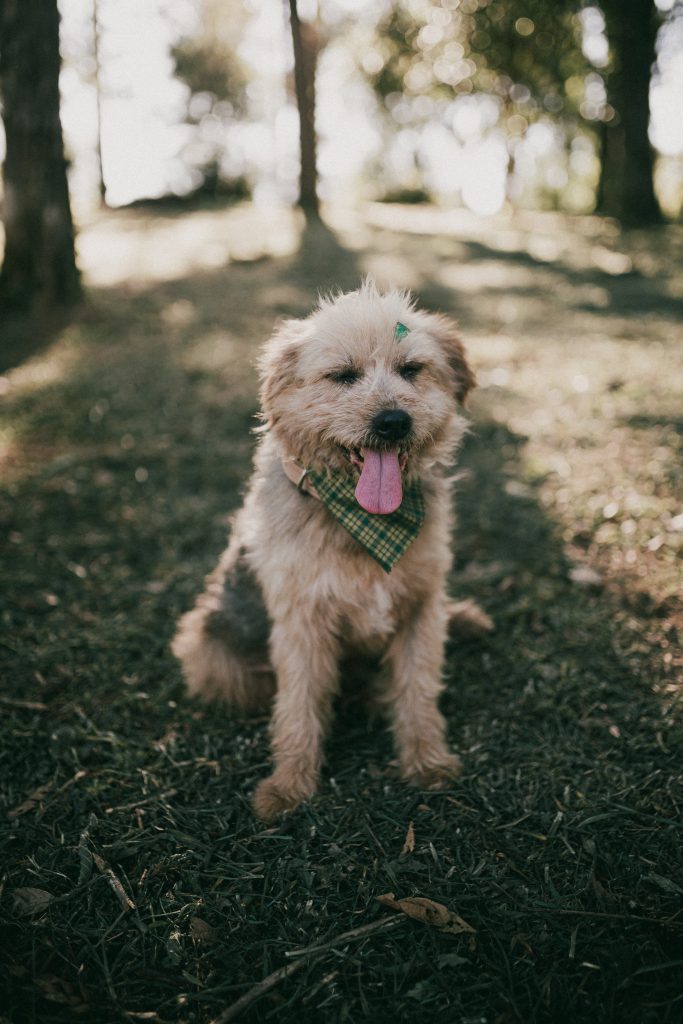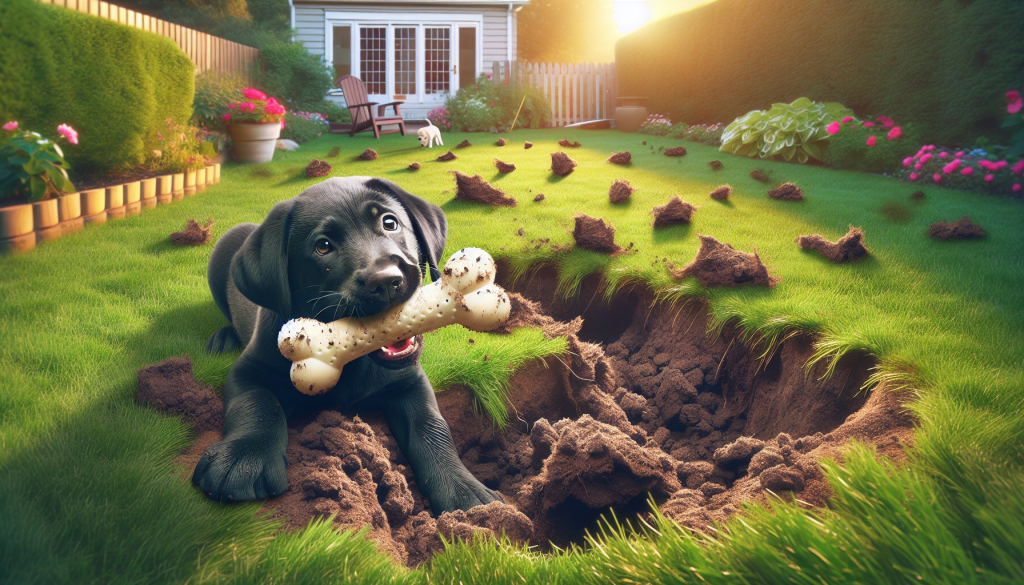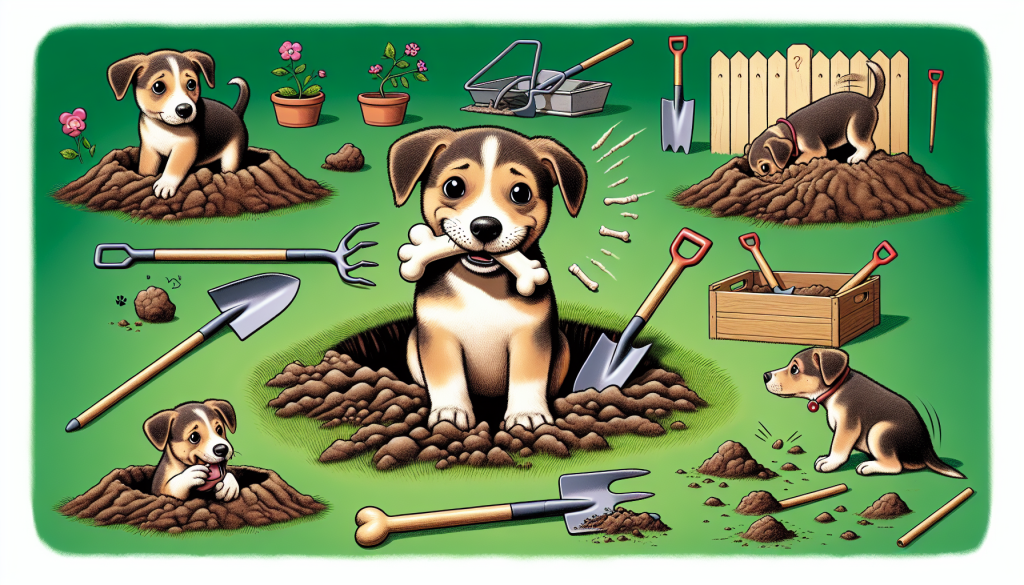If you’re tired of constantly patching up your yard after your adorable little furball has turned it into a mini construction zone, then it’s time to learn how to stop your puppy from digging. Whether it’s out of boredom, curiosity, or just plain mischief, this behavior can be frustrating to deal with. But don’t worry, because in this article, you’ll find effective and friendly ways to put an end to your pup’s diggy adventures, so you can have a beautiful yard and a well-behaved and happy puppy.

This image is property of images.pexels.com.
Understanding the Reasons for Digging
Digging is a natural behavior for dogs and can serve various purposes. By understanding the reasons behind your puppy’s digging habits, you can address the underlying causes more effectively.
Lack of exercise and stimulation
One common reason why puppies dig is due to a lack of exercise and mental stimulation. If your puppy isn’t receiving enough physical activity or mental enrichment, they may resort to digging as a way to release pent-up energy or alleviate boredom.
Instinctual behavior
Digging is an instinctual behavior deeply ingrained in a dog’s DNA. In the wild, dogs would dig to create a den, search for prey, or bury their food for safekeeping. While domesticated dogs may not have the same motivations, the instinct to dig still exists and can be triggered by various factors.
Attention-seeking behavior
Sometimes, dogs may resort to digging as a way to seek attention from their owners. If your puppy receives attention, even negative attention, when they dig, they may continue the behavior as a means of getting noticed. It’s essential to address this attention-seeking behavior while also providing alternative outlets for your puppy’s need for attention.
Creating a Digging Area
To prevent your puppy from digging in undesirable areas of your yard, it’s crucial to provide them with an appropriate digging area where they can satisfy their instinctive urges.
Select a suitable spot
Choose a designated area in your yard where you don’t mind your puppy digging. This could be a corner of the yard, a sandbox, or a secluded patch of land. Ensure that the area is easily accessible for your puppy and has enough space for them to engage in digging without causing damage to other parts of the yard.
Make the area enticing
Make the designated digging area enticing for your puppy by loosening the soil, adding sand or soft mulch, and burying some toys or treats for them to discover. By creating an appealing and rewarding digging spot, your puppy will be more likely to choose this area over other areas of the yard.
Introduce positive reinforcement
Whenever your puppy uses the designated digging area, shower them with praise and rewards. This positive reinforcement will reinforce the idea that digging in that specific area is desirable and increase the chances of them continuing to use it. Consistency and patience are key when implementing this training technique.
Eliminating Potential Triggers
In addition to providing a suitable digging area, it’s important to eliminate or address any potential triggers that may contribute to your puppy’s digging habits.
Identify and address boredom
As mentioned earlier, boredom is a common trigger for digging behavior. Ensure that your puppy receives enough exercise, both physical and mental, to keep them mentally stimulated and prevent boredom. Regular play sessions, puzzle toys, and interactive games can help alleviate their need for entertainment.
Avoid leaving food or toys in the yard
Leaving food or toys in the yard can inadvertently encourage digging behavior. Your puppy may dig in search of buried treats or toys, so it’s best to avoid leaving these items unattended in the yard. Instead, provide your puppy with interactive feeding toys or playtime inside the house to keep them occupied.
Secure the perimeter
If your puppy is consistently digging near fences or boundaries, it may indicate a desire to escape or explore beyond the confines of the yard. Reinforcing and securing the perimeter can help prevent this behavior. Ensure that the fence is sturdy and properly maintained, preventing any potential escape routes.
Training Techniques to Stop Digging
Proper training techniques can help redirect your puppy’s digging behavior and discourage them from digging in unwanted areas.
Positive reinforcement and redirection
Whenever you catch your puppy starting to dig in an inappropriate area, redirect their attention to an acceptable activity or their designated digging spot. Use positive reinforcement, such as treats and praise, to reward them when they comply with the redirection. Consistency and repetition will help reinforce this behavior.
Teaching a ‘Leave it’ command
Teaching your puppy a “leave it” command can be helpful in preventing them from digging in areas where they are not permitted. This command will teach them to ignore or move away from specific objects or areas. With patience and consistent training, your puppy will learn to respond to the command and avoid digging in prohibited areas.
Use deterrents
If your puppy is particularly stubborn or continues to dig despite your efforts, using deterrents may be necessary. There are various pet-safe products available that can be applied to the ground or sprayed on objects to deter digging. These deterrents typically have an unpleasant taste or scent for dogs, discouraging them from digging in treated areas.

This image is property of images.pexels.com.
Preventing Future Digging
Once you have addressed your puppy’s current digging habits, it’s important to take preventive measures to avoid future instances of unwanted digging.
Provide sufficient exercise and mental stimulation
Ensuring that your puppy receives adequate exercise and mental stimulation is crucial in preventing digging behavior. Regular walks, playtime, and interactive toys will help burn off excess energy and keep their minds engaged. A tired and mentally satisfied puppy is less likely to resort to digging out of boredom or frustration.
Supervise outdoor time
Supervising your puppy while they are outdoors is essential, especially during the initial stages of training. By keeping an eye on them, you can promptly redirect their attention if they begin digging in inappropriate areas. As your puppy becomes more accustomed to the designated digging spot, you can gradually reduce supervision.
Consider professional training or advice
If your puppy’s digging behavior persists despite your best efforts, seeking professional training or advice can be beneficial. Professional dog trainers or behaviorists can provide personalized guidance and techniques tailored to your puppy’s specific needs. They can identify any underlying issues and help you develop a training plan to successfully address the digging behavior.
The Importance of Consistency and Patience
Consistency and patience play a vital role in addressing your puppy’s digging habits effectively. It’s important to maintain a consistent approach to training, using the same commands, redirection techniques, and reinforcement methods. By providing positive reinforcement and rewards for desired behavior, your puppy will associate digging in appropriate areas with positive outcomes. It’s also important to remain patient throughout the training process, as it may take time for your puppy to fully grasp the desired behavior.

This image is property of images.pexels.com.
Addressing Separation Anxiety or Loneliness
Some puppies may exhibit digging behavior as a result of separation anxiety or loneliness. If you suspect that your puppy’s digging is related to these issues, it’s important to address them appropriately.
Identify signs of separation anxiety
Signs of separation anxiety in puppies may include excessive barking or howling when left alone, destructive behavior, pacing, or attempts to escape. If you notice any of these signs, it’s essential to address the underlying anxiety through appropriate training and techniques.
Gradual desensitization techniques
Gradual desensitization techniques can help alleviate separation anxiety and reduce digging behaviors. Gradually increase the amount of time your puppy spends alone, starting with short intervals and gradually lengthening them. Pair this alone time with positive experiences, such as treats or special toys, to help your puppy associate being alone with positive outcomes.
Consider professional help
In severe cases of separation anxiety or persistent digging behavior, it may be necessary to seek professional help. A certified dog behaviorist or trainer can provide guidance and develop a comprehensive plan to address separation anxiety, which can ultimately alleviate the associated digging behavior.
Dealing with Medical Causes of Digging
Occasionally, digging behavior in puppies can be caused by underlying medical conditions. If you have ruled out behavioral and environmental factors and your puppy’s digging persists, a visit to the veterinarian is recommended.
Consult a veterinarian
Consulting a veterinarian will help determine if there are any underlying medical issues contributing to your puppy’s digging behavior. The veterinarian may conduct a thorough examination, run tests if necessary, and provide appropriate treatment or recommendations.
Rule out health issues
Various medical conditions, such as allergies, skin irritations, or parasites, can cause itching or discomfort in dogs. In some cases, digging may be a way for your puppy to relieve these discomforts. By identifying and addressing any health issues, you can potentially resolve the digging behavior.
Address any underlying medical conditions
If your veterinarian identifies an underlying medical condition, follow their recommendations for treatment. Treating the root cause will not only alleviate your puppy’s discomfort but may also resolve their digging behavior.

Considering Environmental Factors
Your puppy’s environment plays a significant role in their behavior, including digging tendencies. Modifying the environment to discourage digging can be an effective approach.
Adapting the environment to discourage digging
There are several ways to adapt your puppy’s environment to discourage digging behavior. For example, covering exposed soil with rocks or decorative gravel can make digging less appealing. Additionally, creating barriers such as fencing or landscaping can restrict access to areas where digging is unwanted.
Use deterrents for specific areas
If your puppy consistently targets specific areas, applying a pet-safe deterrent can help discourage digging. These deterrents often have an unpleasant taste or scent, deterring dogs from digging in treated areas. However, it’s important to ensure that the deterrents used are safe and non-toxic for your pet.
Provide alternative entertainment
Proactively providing alternative forms of entertainment for your puppy can divert their attention away from digging. Engage them in interactive toys, puzzle feeders, or mentally stimulating games indoors to keep their minds occupied and prevent boredom or frustration that may lead to digging.
Seeking Help if Digging Persists
In some cases, despite your best efforts and consistency in implementing training techniques, your puppy’s digging behavior may persist. Recognizing when professional help is needed and utilizing dog training classes or experts can be beneficial.
Recognizing when professional help is needed
If your puppy’s digging behavior continues to escalate or if it is causing considerable damage to your property, seeking professional help is warranted. A professional dog trainer or behaviorist can assess the situation, identify potential underlying issues, and develop a customized training plan to address the problem effectively.
Utilizing dog training classes or experts
Enrolling in dog training classes or seeking guidance from reputable dog training experts can provide valuable insights and techniques for managing and redirecting your puppy’s digging behavior. These professionals have the knowledge and experience to address various behavioral issues and will work with you to overcome your puppy’s digging habits.
Understanding the value of patience and persistence
In closing, it’s essential to recognize that addressing digging behavior in puppies requires patience and persistence. Training takes time, and it’s normal for progress to be gradual. By maintaining a positive and consistent approach, you can help your puppy develop appropriate behaviors and enjoy a harmonious relationship with them.
In closing, understanding the reasons for digging, creating a designated digging area, eliminating potential triggers, employing training techniques, addressing underlying issues, and modifying the environment will all contribute to effectively stopping your puppy from digging in the yard. Remember to be consistent, patient, and seek professional help when needed. With perseverance and a friendly approach, you can foster positive behaviors and create a happy and enriching environment for your puppy.
